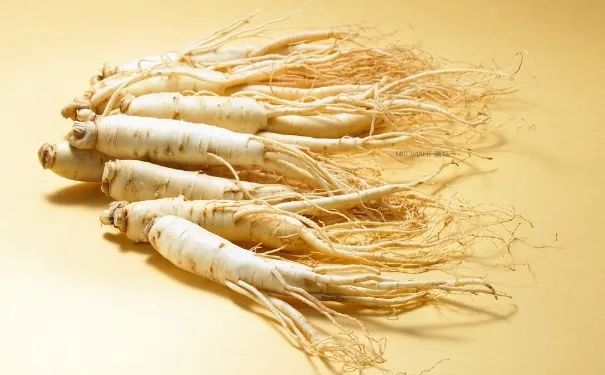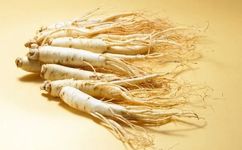Ginseng is a medicinal herb known for its excellent tonic properties and is considered a precious traditional Chinese medicine. Many people have heard of ginseng but are not fully aware of its effects. It seems to have numerous benefits, so what are the effects and benefits of ginseng? How should it be consumed? Let’s take a look!

1. Effects and Benefits of Ginseng
1. Regulation of the Central Nervous System
Ginseng can regulate the central nervous system, improving the balance between excitation and inhibition in the brain. It enhances both mental and physical work capacity, increases work efficiency, and has anti-fatigue effects.
2. Promotion of Energy Utilization in the Brain
Ginseng can enhance learning and memory abilities. The effective components that enhance learning and memory in ginseng are ginsenosides, particularly Rb1 and Rg1, which have a positive impact on learning and memory functions. Ginsenosides from ginseng roots promote learning and memory processes in normal rats, while ginsenosides from ginseng stems and leaves significantly improve memory impairment caused by electroshock in rats. Both types increase the levels of monoamine neurotransmitters in various brain regions of normal rats. These studies provide valuable references for the rational application of ginseng resources.
3. Improvement of Cardiac Function
Ginseng can increase myocardial contractility, slow the heart rate, and enhance cardiac output and coronary blood flow, providing protection against myocardial ischemia and arrhythmias. It has a significant impact on cardiac function, cardiovascular health, and blood flow. Ginseng exhibits notable hypoxia tolerance, and its preparations can effectively combat sinus bradycardia. Ginsenosides can accelerate lipid metabolism and significantly lower high cholesterol levels. Low doses of ginseng can mildly elevate blood pressure in anesthetized animals, while high doses can lower it. Different ginseng preparations enhance the function of isolated frog hearts and the hearts of rabbits, cats, and dogs, improving myocardial weakness during ventricular fibrillation.
4. Blood Sugar Reduction
Ginseng contains ginsenosides and ginseng polysaccharides. Notably, ginsenoside Rb2 has a significant blood sugar-lowering effect, while ginseng polysaccharides (or glycopeptides) represent another class of blood sugar-lowering components in ginseng.
5. Enhancement of Immune Function
Ginsenosides and ginseng polysaccharides are active components that regulate immune function, enhancing immunity in both healthy individuals and those with weakened immune systems. Ginseng polysaccharides, purified from ginseng, are high molecular weight acidic polysaccharides that act as immune enhancers. Animal experiments and clinical trials have confirmed their ability to significantly boost human immunity and have certain therapeutic effects on malignant tumors. Clinical observations show that they can extend patient survival time, enhance cellular immune function, reduce the side effects of radiotherapy, and accelerate the repair of damaged tissues. Clinical observations confirm that ginseng polysaccharides have a notable leukocyte-increasing effect, and when used alongside radiotherapy and chemotherapy, they can reduce the side effects of radiotherapy and prevent leukopenia, allowing patients to complete treatment smoothly. There are no side effects reported during the use of ginseng polysaccharides, proving that this medicine is safe and reliable.
6. Enhancement of Resistance to Harmful Stimuli
Ginseng can enhance the body’s stress response and adaptability. It contains ginsenosides that improve anti-stress effects, enabling resistance to hypoxia, high temperatures, and low temperatures.
7. Anti-Tumor Effects
Ginsenosides, ginseng polysaccharides, ginsenoside olefins, ginsenoside alkynes, and volatile oils in ginseng have certain inhibitory effects on tumors, although the mechanisms are quite complex.
8. Antioxidant Effects
Ginseng contains various antioxidant substances, including ginsenosides, ginseng polyacetylenes, and ginsenoside diols. These compounds have anti-lipid peroxidation effects, forming the basis for anti-aging properties. In addition to anti-aging effects, they also regulate physiological functions such as nerve, endocrine, immune functions, and material metabolism. Furthermore, ginseng exhibits antiviral, anti-shock, and weight loss effects. Although ginseng is a highly valued tonic, it is not suitable for everyone. The protein factors in ginseng can inhibit fat breakdown, leading to increased lipid deposition in blood vessel walls, so individuals with coronary heart disease, hypertension, cerebrovascular sclerosis, diabetes, and phlebitis should use ginseng cautiously. Increased blood viscosity can hinder blood circulation, which is referred to as blood stasis in TCM. Ginseng promotes red blood cell growth, and an increase in red blood cells can further elevate blood viscosity.
2. How to Consume Ginseng
1. Steaming
Slice raw sun-dried ginseng, using 2-5 grams daily. Place the ginseng slices in a porcelain bowl, add an appropriate amount of water, seal the bowl, and steam it over boiling water for 20-30 minutes on low heat after the water boils. First, consume the ginseng juice, then swallow the ginseng slices. It is best taken half an hour before breakfast, and continuous use throughout the winter yields excellent results. The amount can be adjusted based on individual constitution and tolerance, preferably under medical advice. For cases of extreme weakness, a larger dose of 15-30 grams can be used, boiled quickly to extract a concentrated juice, and taken in divided doses.
2. Stewing
Use 6-9 grams of ginseng, an appropriate amount of water, and rock sugar in a porcelain bowl or ginseng jar, cover it, and stew it over low heat until fully cooked. First, drink the juice, then eat the residue.
3. Boiling
Break a piece of white ginseng and place it in a clay pot, add water, and boil until the ginseng turns red and the water tastes bitter. Then add a spoonful of honey and stir to combine the effective components. This soup is called ginseng honey soup, and it should be consumed every morning for both vitality enhancement and therapeutic effects.
4. Sublingual Administration
Slice ginseng thinly. If using red ginseng, steam it first until soft before slicing. Take 2-3 slices at a time, place them in the mouth to dissolve, and chew thoroughly to promote saliva and invigorate the spirit. This is a simple method of consumption. Holding ginseng slices in the mouth and slowly chewing can strengthen and nourish the body and defend against diseases, and it is particularly effective for oral and throat ailments.
5. Infusion
① Ginseng Tea
Place ginseng slices in a bowl or cup, pour boiling water over them, cover, and let steep for about 5 minutes before drinking. Repeat this method until the ginseng flavor is gone, then consume the slices as well.
② Ginseng Wine
Homemade ginseng wine is often used for strengthening, replenishing vital energy, and promoting longevity. One method is to soak 200 grams of fresh ginseng in 1 kilogram of liquor for three weeks before drinking. Daily consumption of 10-20 grams is recommended. After the first batch of wine is finished, more liquor can be added to the original bottle until the ginseng skin turns snow white.
Another method is to slice 10-15 grams of ginseng and soak it in 500 grams of white liquor, sealing it and shaking it daily. It can be consumed after two weeks at a daily dose of 30 milliliters.
6. Consumption of Ginseng Products
① Ginseng Pills
After drying ginseng, grind it into powder and mix it with honey to form ginseng pills for adults. Take 2 grams with warm water twice daily.
② Ginseng Candies
Made from honey and ginseng. First, boil the ginseng in a porcelain or clay pot until soft, then mix it with honey until fully absorbed, resulting in a deep red color and sweet taste. Consume 2-3 pieces daily.
③ Ginseng Sugar
Combine ginseng and white sugar in a clay pot, add an appropriate amount of water, boil, and simmer until it forms a sugar block. This is very effective for nourishment.
3. Dietary Contraindications for Ginseng
1. Avoid Overuse of Ginseng
Ginseng is a qi-tonifying herb. It is not suitable to take it casually without symptoms of qi deficiency. Strong individuals without signs of weakness do not need to take tonics unnecessarily. Misuse or excessive use can lead to symptoms like chest tightness and abdominal distension. Some people mistakenly believe that ginseng is a tonic that is beneficial for everyone, which is incorrect.
Whether using red ginseng or raw sun-dried ginseng, it is essential to start gradually and not rush. Overconsumption should be avoided. Additionally, seasonal changes should be considered: generally, ginseng is better consumed in the cool autumn and winter months, while it is not advisable in the hot summer.
2. Avoid Drinking Tea
Tea contains tannins that can bind with ginsenosides, making them less absorbable. Moreover, tea contains caffeine and other substances that can stimulate the central nervous system. We often experience insomnia and irritability after drinking strong tea, which is due to excessive stimulation of the central nervous system. Similarly, ginseng can enhance brain cortical excitation. Therefore, taking ginseng and tea together can significantly amplify this effect, leading to poor sleep, irritability, and headaches, especially for those with nervous system sensitivity or neurasthenia. Thus, tea, especially strong tea, should be avoided when consuming ginseng.
3. Avoid Using Metal Cookware
Metal cookware can react chemically with medicinal materials, so it is best not to use such cookware for preparing ginseng. Clay pots or similar cookware are recommended to ensure the quality of the medicinal materials.
4. Avoid Eating Grapes with Ginseng
Grapes can lead to nutrient loss. They contain tannic acid, which can easily combine with the proteins in ginseng, forming precipitates that affect absorption and reduce efficacy.
5. Avoid Eating Radishes (including white and green radishes) and Various Seafood after Consuming Ginseng
Ancient medical texts state that radishes “descend qi and digest grains.” Modern research shows that radishes aid digestion and diuresis, aligning with ancient views. Ginseng primarily functions to tonify qi. Eating radishes simultaneously can disrupt this effect, as one tonifies while the other breaks down qi, negating the benefits of ginseng. Therefore, ginseng and radishes should not be consumed together. Most tonics have qi-tonifying effects, so they should not be taken with radishes.
This content is for health education purposes only.
It is not intended as clinical diagnosis or medical advice.
Please do not self-medicate; consult a physician for specific guidance.

